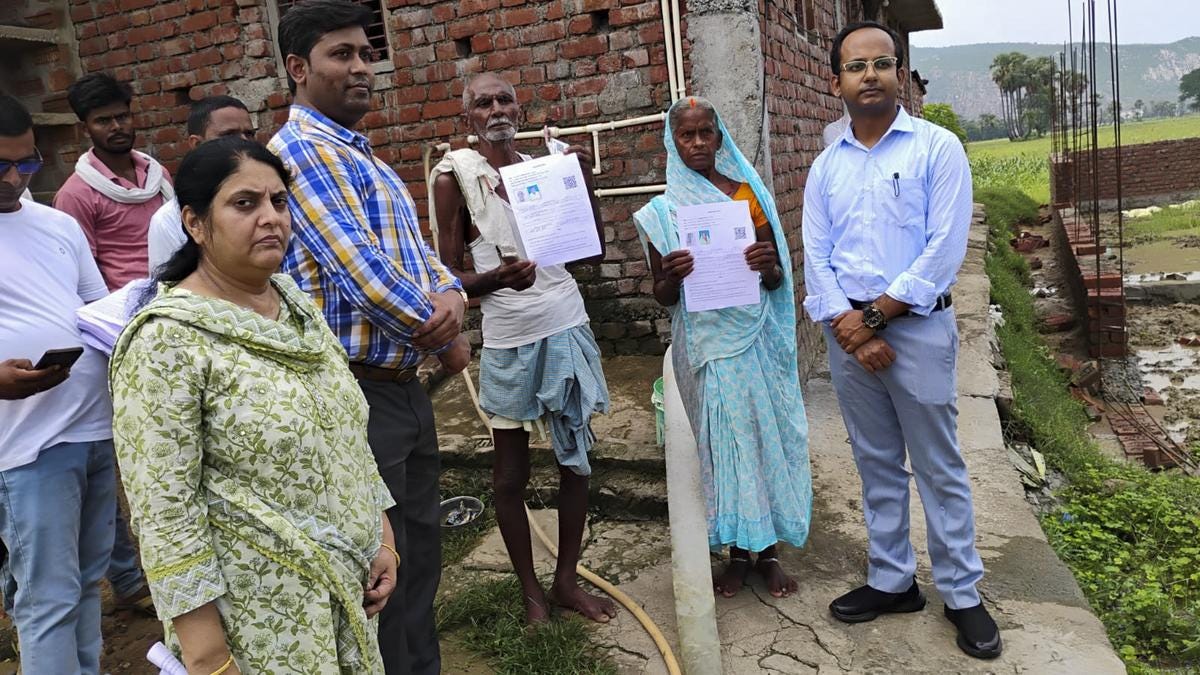Some quick thoughts on the Bihar SIR
The EC should have then asked all parties: what will it take for everyone to believe the next voter list is legitimate?

Hanlon’s Razor: Don't attribute to malice what is easily explained by incompetence. Alleging conspiracy to disenfranchise crores may be politically tempting but seems unlikely. The very unworkability of the SIR makes conspiracy less likely than bureaucratic overreach. You cannot possibly exclude 30% of the population in a democracy in one shot and get away with it. Exclusion through proceduralism is usually quiet and/or targeted. What we’ve seen in Bihar is a chaotic and visible process, not a covert or surgical operation, all of which suggest institutional panic, not a plan to rig democracy.
The timing - on the heels of allegations against voter rolls in Maharashtra - makes it likely that this was an attempt by the EC to shore up its credibility. The EC may have felt compelled to demonstrate that it takes voter roll integrity seriously. But in its haste, it showed clear non-application of mind: launching a state-wide enumeration drive without assessing whether the required documents actually had wide coverage. Since self-declaration raised concerns of misuse, the EC reached for a document-based method. But Aadhaar explicitly states it’s not proof of citizenship, only residence. And other documents such as ration and mgnrega in Bihar may also have deficiencies in terms of integrity
With the opposition attacking the EC, the Commission appears to have jumped the gun and initiated this daft exercise. Rather than absorbing criticism and responding with maturity and consultation, the EC took refuge in bureaucratic procedure - starting a Special Intensive Revision that has created more confusion than clarity. What was needed was a confidence-building political response; what we got was bureaucratic callousness
The EC should have called an all-party meeting and explained its constraints. The integrity of the electoral process - in a country like India - can never rest solely on technocratic mechanisms or investigative vigilance. Both will lead to exclusions or unnecessary citizen harassment. Consequently, the integrity of the process hinges on a shared political architecture - where every stakeholder with competing incentives is part of the process. This is the logic behind both the design of voter roll revision and the use of EVMs.
The EC should have then asked all parties: what will it take for everyone to believe the next voter list is legitimate? Instead, it acted unilaterally, undermining its own credibility and abandoning the very people it is duty-bound to protect. In trying to preserve institutional authority, it ended up shaking institutional trust even more. The EC draws its legitimacy from the citizens, that every last citizen must have the right to voter and express her views without fear. Even the EC’s obligations to political parties are drawn from EC’s duty to the citizens and it must be said that the EC failed in this role in the Bihar SIR
Even now, the EC - and all of us - owe the Bihar voter the right to feel secure and included. We cannot leave crores of people anxious, lining up in queues, desperately clutching documents. If democratic participation is a right, not a largesse, we must ease the pressure on them immediately. To do so, this is a suggested way forward:
EC should pause the SIR immediately and convene an all-party meeting with civil society participation.
Use this moment to engage in collective problem-solving, not blame-shifting.It is also incumbent on the opposition to tone down the rhetoric of conspiracy to disenfranchise and participate constructively while continuing to demand accountability and of course, strengthening ground organisation
Democracy cannot be strengthened by polarisation. The EC’s failings must be addressed—but weaponising every institutional misstep to allege conspiracy only accelerates democratic decay. Both government and opposition - or at least those within who still believe in institutions - must find a way to restore some measure of good faith collaboration. The government and state institutions must take the first step, but the opposition too must respond in good faith.
A small note: I’ve been considering moving more of my writing to this blog. While newspaper op-eds offer wide reach, they also come with constraints - the need for a news peg, word limits, and delays between writing and publication. Writing here allows greater flexibility in form, timing, and tone.
If you’ve found any of these pieces valuable, I’d appreciate your sharing them with others who might find them worthwhile as well.
Also Read:



Nice analysis but I think the use of Hanlon's razor is too quick. One needn't attribute active malice here. But the incompetence, if that is what it is, is in the direction of making it easier to exclude genuine voters, rather than making it easier to include fake voters. This is not a neutral mistake. Such a mistake would not have happened, imo, had it been clear to the EC that the ruling party would oppose it. And *this* ruling party has made its priorities clear in that regard.
I also think that it has been clear for a while that the EC doesn't relate symmetrically to political parties. Critics of the EC have been very clear on their specific complaints, and what it would take the EC to address them; time-and-again the EC has rejected it.
I think the presumption here that parties casting aspersion or the current petition has some element of good faith in it. I don’t think that’s the case at all. They are clearly politically motivated to do this, and any all-party meeting or confidence building exercises etc may have given EC more “credibility” in certain narrative points but wouldn’t have abated the attacks it is facing now. The political reality is that any revision process or action will be challenged because the largest opposition party has basically made a conspiracy theory part of its core theorem on what’s wrong in India today. What else explains the inability of that party wrt Maharashtra?